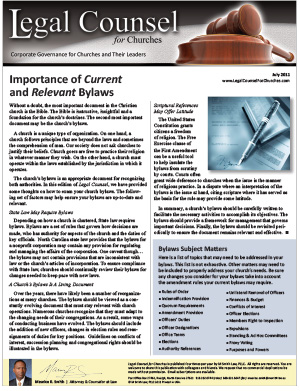Some churches have adopted a Board of Directors format for management. Where a Board has been elected or appointed, it is important that board members have a thor- ough understanding of their legal duties.
Church boards have the ultimate respon- sibility for the management of the church. One of the most important responsibili- ties of the board may be hiring the pastor. Therefore, as a practical matter, boards usually delegate the day to day manage- ment authority to its chief executive officer, the pastor. But there are some re- sponsibilities a board should not delegate. Non-delegable duties include the review of strategic developments, policies, gover- nance decisions and budgets. Ultimately, the board is accountable for how the entire church operates.
Each board member owes a legal duty of good faith, full disclosure, fair dealing, and undivided loyalty to the church. Here is an introductory description of each duty. Board members should commit these du- ties to memory. Failure to obey these du- ties could lead to personal civil liabilities.
Undivided Loyalty. The duty of loyalty requires a director to place the church’s best interest above his/her own. Essentially, a director should not act where he/she has a conflict of interest.
Good Faith. Church directors must act in the best interest of the church. A director should not confuse his/her in- terests with those of the church. Good faith means the director acts with a clear conscience. Good faith requires a director to act with the diligence, devotion, care and fairness toward the church which an ordinarily prudent person would exercise under similar circumstances in a like position. This means a director should be prepared to make well-reasoned decisions during all meetings. A director breaches the duty of good faith when he/she acts negligently or carelessly.
Full Disclosure. A church director should make a full disclosure of the existence of a conflict, and of other “ma- terial” information concerning the sub- stance of a transaction. The disclosure should be made to fellow directors and/ or to the church members from whom approval of the transaction is sought.
Fair Dealing. Fair dealing compels a director to two standards: Substantive and Pro- cedural acts. The Substantive aspect of fair dealing requires that the terms of a trans- action must be fair. This essentially means the terms the church gives or gets should be the terms it would have given or received if it had dealt openly in the marketplace. The Procedural Aspect of fair dealing requires that the transaction and its terms must be arrived at through a fair process. Directors must affirmatively renounce anything that is unfair.

